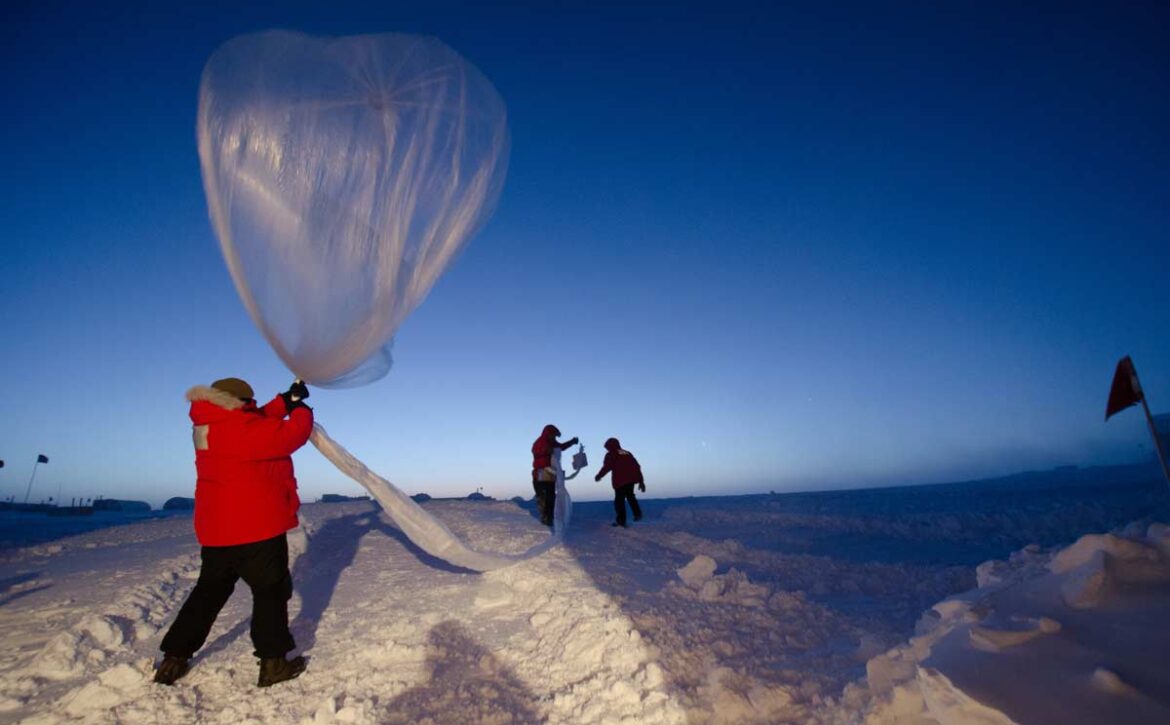If You Think the Weather’s Wacky, A Neighbor Can Probably Explain
Richard Rein, publisher of TapintoPrinceton, covers C-Change Conversation’s article on climate change and the weather.
Richard Rein, publisher of TapintoPrinceton, covers C-Change Conversation’s article on climate change and the weather.
Dear Friends,
Happy Summer! Despite growing up in the Deep South where the weather can be scorching, summer is my favorite season. The long days and the hot stillness make it a time for reflection, reading, and just sitting still and being. The hectic pace and chaos of the “school year” slows.
But that quiet is fleeting. At C-Change, we are back on the road and I’m busy developing new Primers. Two of our presenters, Nancy Ylvisaker and Dallas Hetherington, have given in-person Primer presentations this summer, and I will in August – for the first time since February 2020 – with talks near the beaches of Long Island, New York and in the mountains of North Carolina. While at C-Change it feels like we are getting back to “normal”, Mother Nature is doing anything but. Record-breaking heat, devastating floods, wildfires, drought, and other extreme weather events made worse by climate change continue to cause loss of life, jobs, and property. As one friend complained to me recently, “It seems like climate change is everywhere and on the news every night.” Indeed.
But there’s good news on the climate front, too. The Washington Post’s interview with Rep. John Curtis (R-UT) [paywall] gives me hope. The founder of the Conservative Climate Caucus, which now has more than 60 Republican Members of Congress, holds many views that are aligned with ours: climate change is real and must be addressed; we can protect and even grow jobs as we reduce greenhouse gas emissions; we must do more as responsible stewards of the planet, protecting it for future generations; we must invest in the innovative technologies that show so much promise; and more.
Why are we seeing this shift? In large part because younger voters are demanding it and the climate-fueled damage around us is so visible. The politics surrounding the issue is changing, and that is an important first step toward coming together to create meaningful and long-term solutions.
I hope you enjoy more good news below. As always, we welcome your feedback and questions.
Warmly,
Kathleen Biggins
Founder & President
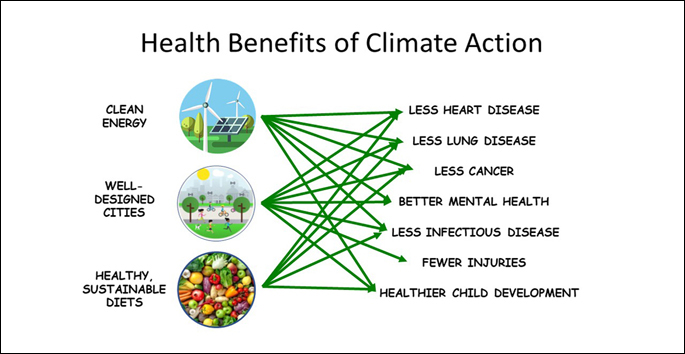
C-Change is launching a new presentation in September! We are eager to share it with new audiences and with those who’ve seen our original Primer. The “Health Primer” covers the basic science of climate change and how it is compromising the essentials of good health: physical safety and shelter, secure food sources, clean water, clean air, and our ability to manage diseases. We’ve scheduled two Health Primer presentations in September – for the Garden Club of Princeton and for Princeton Windrows, an independent living community.
In case you are wondering, the image above (discussed in our Health Primer) is not rhetorical or decorative. Behind every green arrow there’s a body of solid evidence that supports the link between climate action and improved health. If you would like to schedule an in-person or virtual presentation of the Health Primer or our original Primer, please let us know.
C-Change is thrilled that Mark Censits, noted wine and spirits entrepreneur, will be the featured speaker for our fall fundraiser. He is the founder and president of CoolVines, a New Jersey-based company that specializes in artisanal, hand-crafted, and responsibly and sustainably produced wines from around the world.
Extreme heat, drought, and wildfires – which not only can burn crops, facilities, and equipment but also taint grapes with smoke that has wafted from far away – are challenging even the most seasoned of winemakers. As new wine areas are opening up and old areas are losing their ability to grow the best grapes, it is a time of disruption and innovation, providing opportunities for the savvy connoisseur. Mark will share some of his favorite new wines and walk us through how climate change is impacting the wine industry.
The event will be held on September 19, 2021 from 5-7pm at The Watershed Institute in Pennington, NJ. For more information and if you would like to receive an invitation, contact us here.
From Kathleen Biggins – I am pleased to introduce two more important team members who contribute so much to our work: Margaret Sieck and Tina Alt.
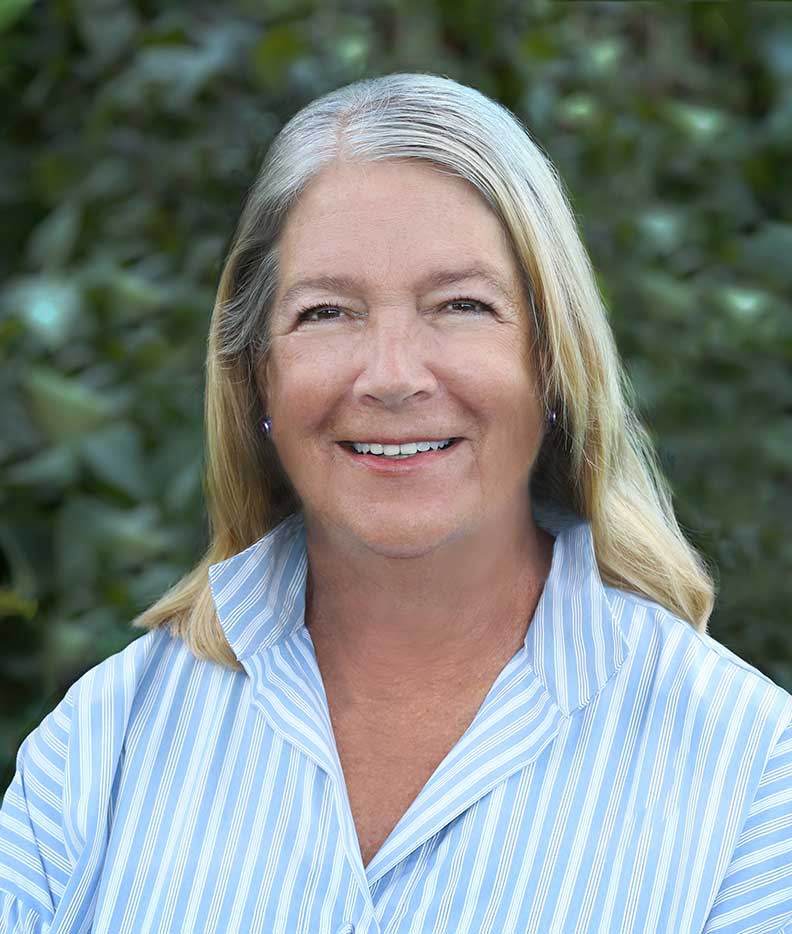
Margaret Sieck was there before the beginning. We were driving back from a conference in Washington, DC together, discussing what we heard from a general and a business person warning that climate change posed significant risks for our geopolitical security and our economy. We were surprised because they definitely did not seem like green-leaning liberals, and yet they had laid out such dire outcomes. And we were concerned because we knew most of our friends and families had a different perspective – that climate change wasn’t real or if it was it would only impact far-off generations in far-off places – and we recognized it would be very hard, if not impossible, to change their minds. It felt so overwhelming, and for long stretches we drove back in silence, feeling defeated.
Fast forward to today and Margaret is a critical player in successfully changing those hard-to-influence hearts and minds. The skills she honed by working at national magazines make her a formidable and seasoned editor (I fondly call her the dragon lady!), and she is a very important part of our communications team. She edits our blogs, newsletters, and op-eds, lending a critical eye to the language we use and finding some of the images we choose to educate our C-Change “family.”
Margaret helps create and protect C-Change Conversation’s unique voice. We couldn’t do it without her!
Why I’m involved with C-Change:
What have you learned about climate change that makes you hopeful?
I am hopeful that more and more people are turning to science and facts to help defend against what is a clear and present danger. I want my grandchildren (soon to number three!) to know that I worked to make a difference and deliver unto them a planet that is not burning up or awash in floods because people cared and acted.
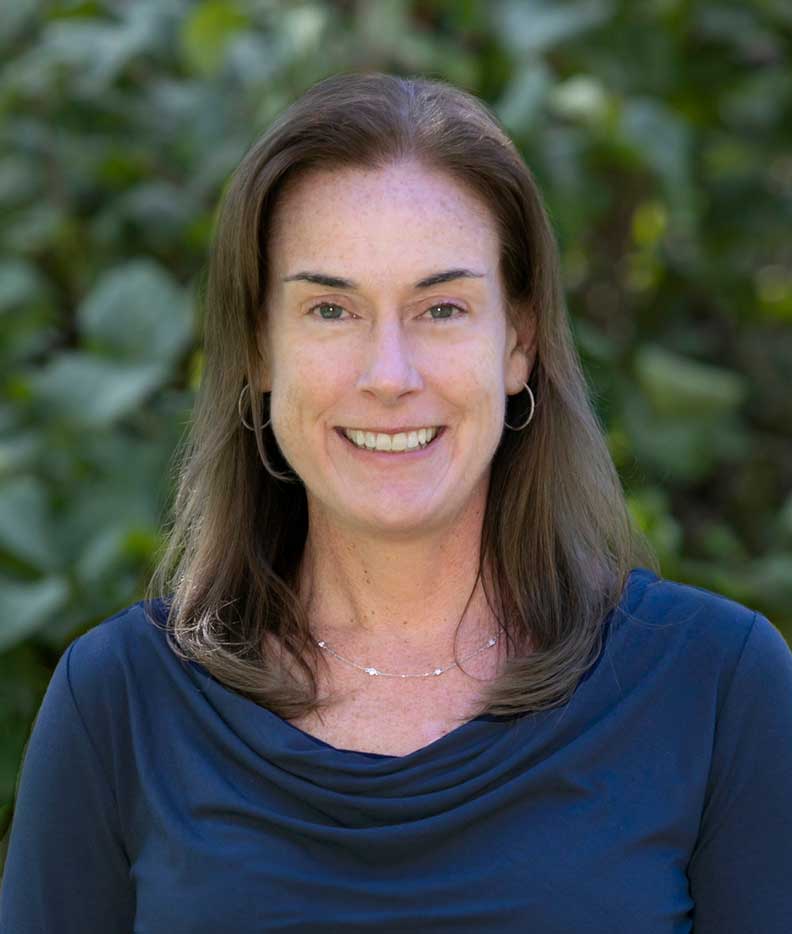
Tina Alt is one of our jack-of-all-trades “can do” volunteers – moving seamlessly from supporting our Primer Presenter training program to helping run our development efforts. One of my favorite stories about her: we were in Tiverton, Rhode Island, and Tina was lying on the floor of the public library taking apart a recalcitrant and complicated technology system to make it accept my computer’s input so we could start the presentation. We had a restive and packed crowd and the library’s staff had been working on the problem for an hour. Tina was unflappable, and she saved the day.
Tina is like that – she is dauntless, organized, rolls up her sleeves and gets things done, and is great under pressure. She brings a fresh point of view and creative solutions. As a Physician’s Assistant, she has keenly focused on the science underpinning climate change and on how it will impact our personal health and health systems.
Tina approached us after hearing our Primer presentation at the Lawrenceville School, where her children were students. We are so glad she did!
Why I’m involved with C-Change:
Through the Primer and our other educational programs, C-Change Conversations explains climate change in a clear way that follows logic and the science and makes it easy to understand why it is urgent to change our individual behaviors and call for change in government and corporate policies. I especially like how we emphasize that climate change is impacting our national security, jobs, and the economy and that this is an issue that transcends politics.
What have you learned about climate change that makes you hopeful?
There are many possible ways to reduce carbon in the atmosphere, even though current technologies are expensive and not yet 100% successful. It reminds me a little bit of cancer – when curing cancer used to be a dream and now for many kinds of cancer, it is a reality. I also am hopeful because I know there is also a lot we can do in our own lives that are small adjustments that will significantly reduce our carbon footprint.
Our climate change Primer has been in demand this spring and summer, both virtually and in person. Pictured here is Dallas Hetherington, presenting in July at an event in New Jersey hosted by the Mantoloking Environmental Commission and the Mantoloking Yacht Club.
After his talk, an audience member wrote, “Loved it! Climate change is quite a multifaceted topic, and I found the presentation to be very digestible. I especially appreciate the highlight of business contribution to the climate crisis, in that it’s important to remind folks that voting matters (individuals can only have so much power in holding businesses accountable, and we need to do so through policy/legislation).” In June, Dallas also presented the Primer (virtually) to his Chi Phi, Rho fraternity brothers.
Other recent events include Catherine Sidamon-Eristoff and Nancy Ylivsaker presenting the Primer virtually to the Lenox (MA) Garden Club, Kathleen Biggins and Joan Schiller presenting (also virtually) to The Study Group in St. Louis, and Nancy presenting in person to the St. Louis Women’s Club.
In 2021, we’ve presented the Primer 27 times to nearly 1,200 people! Would you like to schedule a talk for your employees, associations, and community groups? The Primer provides audience members with the scientific facts and language to talk about the issue with others. We welcome the opportunity to present to anyone interested in a fair and balanced approach to climate change, including people who do not think climate change is a significant threat, along with those who are already concerned.
Our current August-October Primer schedule includes in-person presentations to:
Dear Friends,
“Disruption” was the word-of-the-month for June. C-Change Conversations sees a warming globe as the biggest disrupter of all, with cascading effects from droughts and wildfires to disasters that are both economic and social in nature.
This year’s shockingly early extreme weather events are a case in point. After record temperatures and drought last year, the Western United States was again in the grip of an unprecedented heat wave by mid-June – barely the start of the 2021 hot season. It’s premature to blame climate change definitively. After all, mercury typically spikes in the summer. But with the Olympic Track and Field trials disrupted when the temperatures on the track measured 150 degrees in normally cool Eugene, Oregon, clearly something else was going on. To put it mildly, as NPR did, this is “not your average heat wave.”
The good news is that forces across the economy are responding with large and small disruptions of their own aimed at securing human safety, well-being, and economic opportunity. This month, we’ll brief you on a few big disruptive developments and also spotlight some mid-sized innovations with potential for big, positively disruptive payoffs.
As ever, we hope you’ll pass along anything you find interesting. And, of course, use the information to enrich your own conversations about climate change with friends, family, business associates, and community and political leaders.
Warmly,
The C-Change Conversations Team
“We find that millions are at risk … not years in the future, but this summer.
Behind the sizzling headlines about blistering weather is a disturbing pattern of ever longer, broader, and hotter American heat waves. And while we don’t know exactly how climate change is contributing to the intense heat in the Pacific Northwest, we do know it is having at least some impact.
Similar weather patterns, of course, are now being felt world-wide with direct and long-term implications for life-sustaining resources that will affect us all – but some of us sooner than others. The Northern Triangle nations of El Salvador, Guatemala, and Honduras – with high populations of subsistence farmers – have endured drought five out of the past ten years. The resulting food insecurity is considered a key factor in pushing some 300,000 migrants north to the United States each year [paywall].
Water supplies and essential food production are obviously the most critical vulnerabilities in the agricultural sector, but climate disruption is also affecting cash crops and products such as chocolate, coffee, wine, and beer. And, in a sign of the times, even salmon are struggling against drought. California’s Fish and Wildlife Service is planning to truck 17 million Chinook salmon downstream from their hatching areas in the Central Valley because their regular water routes to the sea have already dried up or become too heated for the fish to migrate on their own.
It turns out that NIMBYism thrives in unexpected corners. Local residents and environmental activists – who otherwise support clean energy – are disrupting utility-scale solar projects [paywall]. Their concerns – including aesthetics, landscape preservation, and endangered species – show that vexing tradeoffs on the road to carbon neutrality remain.
And in the category of not seeing eye to eye, we’re sorry to see a face-off brewing between Democratic municipal governments and Republican state legislatures over natural gas in private homes. As a growing number of towns and cities around the nation enact laws to prohibit or discourage gas-fueled cooking and heating, a growing number of states are passing laws to prohibit such legislation. The outcome of the battle may disrupt the utility industry and reshape domestic demand for natural gas [paywall].
The aforementioned face-off notwithstanding, the big news in partisan politics in June was the tiny crack in the polarization around climate change. Nearly one-third of congressional Republicans just launched the Conservative Climate Caucus, and others are readying to unveil climate policies of their own.
And in boardrooms and shareholder meetings, more and more of America’s investor heavyweights are pushing the climate agenda. “Wall Street senses a new climate [no pun seemingly intended] and is positioning itself accordingly,” writes Tim Quinson in Bloomberg. Hurrah! Black Rock and Vanguard, for example, are vocally happy to back shareholder initiatives to disrupt the status quo at companies like Exxon and beyond, though we observe a robust dose of risk analysis at play in their calculations, also.
June saw several disruptive legal and policy initiatives at the national and state levels. Let’s start with Belgium. In a landmark ruling, a Brussels court has declared the country’s failure to meet its climate targets breached the European Convention on Human Rights. It’s the latest legal victory against governments that have broken climate promises and could have international implications.
In more news from Brussels, the 27-nation European Union is reportedly preparing to impose levies on imported goods with high levels of “embedded” carbon such as steel, cement, and aluminum. The idea is to penalize countries with lower standards for carbon reduction as the EU tightens its own environmental rules and shoots for climate neutrality by 2050.
Closer to home, the state of California’s insurance regulator is endorsing sweeping changes to discourage new house construction in fire-prone areas [paywall]. The proposed changes are a bit wonky but important, with potential for disrupting the state’s real estate market and becoming a model for other states where climate change is making home insurance a lynchpin issue.
Finally, we’ll leave you with this: “ecocide” has been defined by a panel of 12 legal scholars from around the world as a new, international crime with intended equivalence to genocide. Although the declaration carries no legal weight at this point, it envisions prosecutions before the International Criminal Court in the Hague and is considered an important milestone in the campaign to prosecute individuals and companies responsible for severe and widespread or long-term environmental damage, such as extensive deforestation of the rainforest or the Chernolyl nuclear accident.
Carbon utilization – aka “carbontech” – is gaining momentum and even profitability [paywall]. Carbontech is a catch-all phrase for commercial products made with CO2 emissions captured from power plants or other sources. By one estimate, the international market for carbontech products could be nearly $6 trillion.
Researchers at the University of Cambridge have found a way to replace single-use plastics with a plant-based material they are calling “vegan spider silk.” The process reportedly is scalable, energy-efficient, and results in a “plastic-like free-standing film” which can even be composted at home.
And if that doesn’t excite you, how about solid-state batteries? As elusive as pixie dust, this long-promised technology could, among other things, double or triple the range of electric cars and reduce recharging times to a fraction of current requirements. Multiple companies are working on them, which means we should finally see solid-state batteries on the market in the next few years.
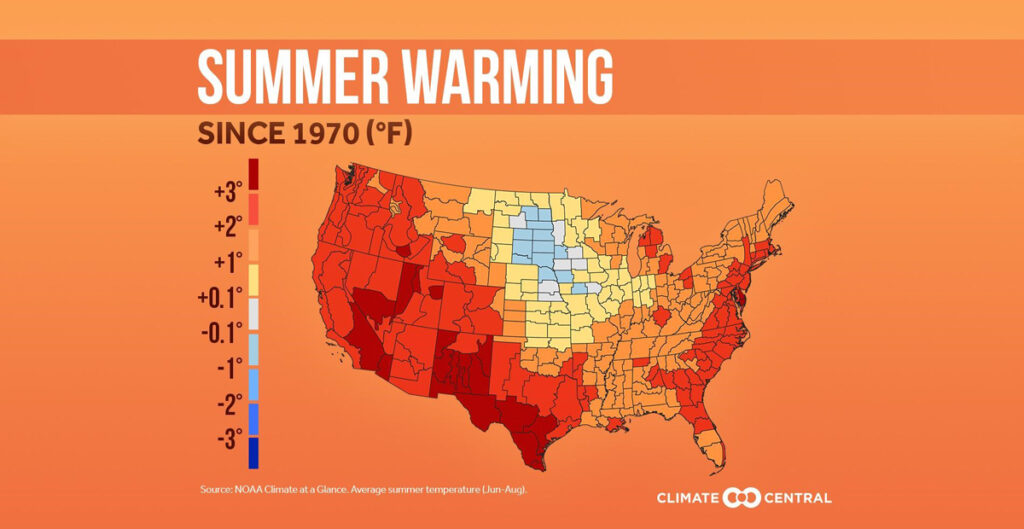
According to Climate Central, summers are getting hotter, and not just in the Pacific Northwest. In the past 50 years, 74% (179) of the 242 cities analyzed recorded an extra week or more of days with above-normal temperatures. The top 30 cities with the greatest increases, all recording a month or more of additional days above normal, were concentrated in the southern United States – particularly in the Southeast and Texas.
And areas on the map above that appear to be cooling during summer months? Those areas are still warming overall, but most of their warming signal shows up in winter. There is no definitive answer about the summer warming hole across the Upper Midwest/Northern Plains, but as Climate Central Meteorologist Sean Sublette wrote recently, “The early reasoning behind the cooling signal in the northern Plains is likely related to land use – there is now a greater coverage of corn and soybeans in the hotter months. Colloquially known as ‘corn sweat,’ the plants give off more moisture from their leaves … which leads to more evaporation, which has a cooling effect (like when you get out of a pool). But this is an area of active research.” To learn more, read Summer Climate Change in the Midwest and Great Plains due to Agricultural Development during the Twentieth Century (2019).
The latest Q&A with our climate science advisors explores hurricane forecasts, the difference between water cycle and water table, whether we could be headed toward a glacial period, and more.
Written by a prominent academic and science policy-maker, “Unsettled: What Climate Science Tells Us, What it Doesn’t, and Why It Matters” contends that man-made climate change is indeed occurring, but points out several inconsistencies between what climate science says and what the public perceives.
Dear Friends,
In May we saw remarkable steps in the fight against climate change from such unexpected corners that the possibility of a tipping point in climate action can’t be ruled out. If that sounds like a hesitant ‘hallelujah,’ it is. Without doubt, there’s cause for celebration. From the boardrooms of Houston to the courtrooms of the Hague, an unlikely collection of shareholder activists, investors, and environmental litigants scored a series of big wins that – separately and together – were hailed as game-changing developments against business as usual.
But countervailing winds are blowing, too. For example, we’re tracking the fallout of a letter from the treasurers of 15 U.S. states to the Biden Administration, threatening to pull the states’ assets from financial institutions that agree to decarbonize their lending and investment portfolios.
Helping our readers sort through stories like these is exactly what C-Change Conversations was created to do. We hope our resources educate and inspire you to talk more about climate change, especially with elected officials, and encourage everyone you know to listen to the evidence and heed the logic that some of the world’s most hard-headed business leaders see clearly.
The tides are turning. Let’s not allow this progress to be too little, too late.
Warmly,
The C-Change Conversations Team
“China is not the only perilous threat to our nation. We are regularly warned of the consequences of climate change. Many of us take the only actions we know how to take: turning down thermostats in winter, buying energy-efficient vehicles, separating our trash. Politicians pass small-bore measures to appease progressive voters. Being more attuned to political advantage than to actual impact, politicians shy away from committing to remedies that have the potential to slow the warming: putting a price on carbon, carbon border adjustment tariffs, nuclear power and direct carbon capture. These, too, would require investment, sacrifice and political courage.”
– Senator Mitt Romney (R-UT), writing in the Washington Post
May 26th saw a veritable hat trick of three portentous scores against the sluggish response of big oil – ExxonMobil, Shell, and Chevron, specifically – to climate change. “Stunning defeat” [paywall] is how some news outlets described ExxonMobil’s face-off with activist investors in their campaign to elect new board members dedicated to steering the oil and gas giant toward a more climate-friendly stance. The revolt is evidence of the growing strength and willingness of Wall Street firms to push CEOs toward greener policies.
On the same day, a Dutch court issued a landmark decision [paywall] compelling the oil titan Royal Dutch Shell to cut carbon emissions 45% by 2030 – far faster than previously planned. The case was filed by seven activist groups on behalf of more than 17,000 Dutch citizens claiming the company’s business model endangered their lives and human rights. The plaintiff’s lawyer called it a ‘turning point in history’ that could set a precedent in other jurisdictions around the world.
And then, an astonishing 61% of Chevron shareholders voted in favor of a resolution to not only lower its own emissions but also, remarkably, to cut the emissions generated by the users of Chevron’s products.
Also from within the industry, the conservative International Energy Agency issued its own roadmap for achieving net-zero emissions by 2050. This report, like other roadmaps we’ve told you about, concludes that net-zero emissions are achievable and, strikingly, that no new fossil fuel supplies will be needed to meet global demand beyond those being tapped today.
And remember the ‘Texas freeze’ this winter? Some state lawmakers responded to the deadly storm and the catastrophic failure of the Texas power grid by falsely blaming windmills. Legislation has even been introduced to target the renewable industry with added charges and responsibilities. But it appears economics may trump politics, as a new report from the U.S. Energy Information Administration predicts Texas is on track to rival California as the state with the most utility-scale solar. A full one-third of large solar facilities planned for the next two years will be in the Lone Star State.
While we are hopeful that the surge in shareholder and investor awareness will spark more positive steps in climate action, scientists continue to deliver warnings that 7 of the earth’s climate systems may each be reaching a tipping point – and possibly faster than predicted. Also in May, the Environmental Protection Agency released a report [paywall] that delivered alarming evidence that the U.S. and the world have moved into unprecedented climate territory.
Unfortunately, there are plenty of people who prefer to look the other way (like the aforementioned consortium of state treasurers). Another example: commercial agriculture enterprises in some 23 nations that haven’t lived up to commitments on deforestation. Governments and corporations promised more than seven years ago to stop clear-cutting the tropical forests so critical to global climate. In that time, however, an area more than twice the size of California has been stripped of its trees – representing a 50% increase in the rate of deforestation.
Meanwhile the world’s top meteorologists have upped the odds to over 40% that global warming will exceed the limits set by the landmark 2015 Paris agreement within the next five years. The repercussions – including crop failures, flooded cities, and more disease – are increasingly predictable. In fact, insurance giant Swiss Re has put a price tag on the economic losses [paywall] we can expect by 2050 from climate change at an eye-watering $23 trillion or 11-14% of global economic output. The company’s conclusions might influence how the industry prices insurance and directs its investments in the coming years.
The human costs of climate change are very real and very now. The Internal Displacement Monitoring Centre reports that extreme weather displaced some 30.7 million people in 2020. That’s about three times more than the number of people forced to move by conflict and violence.
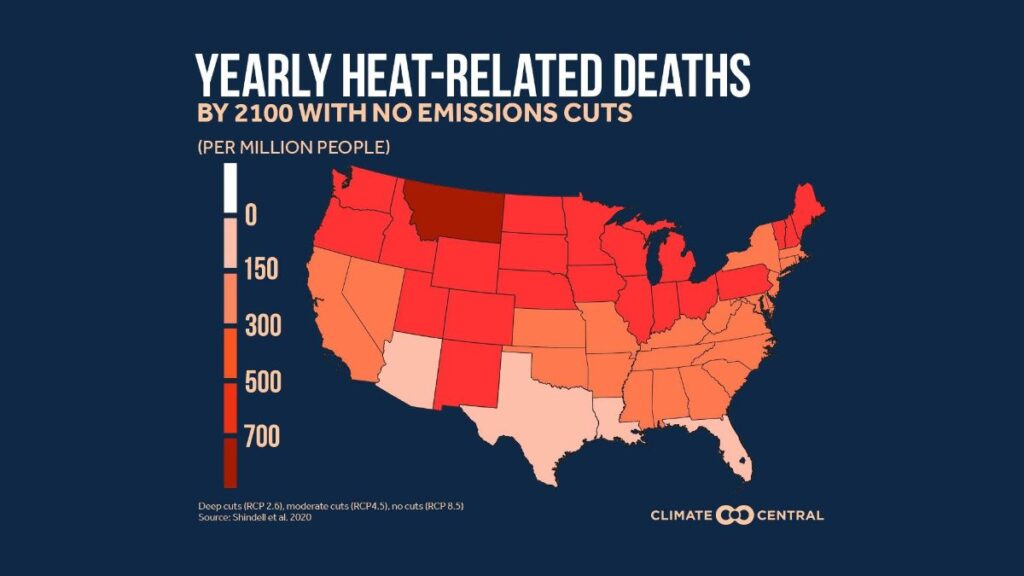
Surprising fact: heat kills more people than all types of weather hazards, including hurricanes and tornadoes. Roughly 12,000 Americans die of heat-related causes annually, according to research by scientists at Duke University. Hotter summer temperatures can contribute to poorer air quality and heat stroke and other heat-related illnesses. Baby boomers and older individuals are especially hard hit by summers that have grown hotter because of climate change. So, in addition to doing what you can to curb greenhouse gas emissions, please be extra careful this summer, and check on elders who are alone in sweltering weather.
“We face all kinds of threats in our line of work, but few of them truly deserve to be called existential. The climate crisis does. No nation can find lasting security without addressing the climate crisis.”
– U.S. Secretary of Defense Lloyd Austin, April 23, 2021
Today is Armed Forces Day, when we celebrate men and women serving in the U.S. military. Across the country, there will be parades, speeches, and other tributes to our service members.
As we honor them, we should remember that climate change is making their jobs more difficult and dangerous. Our military leaders are warning that we need to embrace climate action now to keep our troops safe. Here are their key points:
“This has to be everybody’s fight,” says Ron Keys, a retired Air Force general. We hope you will watch and share his video explaining why our military cares about climate change.
So please, support our troops and raise your voice. Thanks for helping us keep the conversation going.
Warmly,
The C-Change Conversations Team
The Star Ledger publishes an article by C-Change Conversation’s founder, Kathleen Biggins, discussing climate change and the economy.
Dear Friends,
After decades of slow walking and fractious talking about the climate crisis, we see a notable consensus forming across society that climate change poses a real and significant risk. President Biden’s Climate Summit last week underscored both the need for a big and coordinated effort and the difficulties of doing so on a global scale.
It’s important to note that the business community and economists are pushing Biden to be aggressive – recognizing the potentially crushing economic losses ahead if we do not act quickly and forcefully enough. Republicans have rolled out their own climate platform, and legacy players from oil giant ExxonMobil [paywall] to the Crown Prince of Saudi Arabia are adding their voices to the concerned climate change chorus.
We applaud the movement, but also ask: What next? Recent news (highlighted below) gives us a hint to the answer as we race to develop new technologies and understand the changes we are triggering in the natural world.
Understanding “What next?” makes our mission – to build the consensus across party lines needed for bold action – all the more critical.
Warmly,
The C-Change Conversations Team
“We are at the point where climate change means systems change – and almost every system will change. That understanding is long overdue, but I don’t think we know exactly what it means yet. It’s a moment of maximum hope; it’s also a moment of high risk.”
Rachel Kyte, Dean
Fletcher School of Business at Tufts University
The first mass-produced car that runs on sunlight puts to bed any ideas that non-emitting cars need be dull and fusty: it seems solar batmobiles [paywall] may be the vehicle of the future.
And while watching cement dry may be no one’s idea of excitement, this turned our heads: a new recipe for low-carbon concrete that permanently absorbs and traps greenhouse gases. This is a “Eureka” moment, and something academics thought impossible. Nearly 9% of the world’s carbon dioxide emissions come from concrete production already, and with the projected growth of megacities we will need a lot more concrete in the future. This breakthrough provides new hope.
If anybody still needs convincing that we may be losing our race against time, consider this: scientists believe climate change could literally be causing the earth to tilt on its axis. A new study concludes that glacial melt on a massive scale caused by global warming explains why the position of the poles has moved about four meters since the 1980s. Read the plain language summary here.
New research also shows that global warming is weakening planetary ocean currents that affect climate on both sides of the Atlantic Ocean. The changes are expected to cause rising sea levels and change weather patterns across the globe.
Not surprisingly, such galactic shifts could have devastating economic consequences. Nearly three-quarters of economists agree that “immediate and drastic action” is needed to curb emissions. A 300-strong group of major corporate leaders urged Biden to “go big” on emission reductions. Adding to the chorus, a new report by insurance giant Swiss Re warns that $23 trillion could be lost from the global economy by 2050 and concludes starkly: “Climate change poses the biggest long-term risk to the global economy. No action is not an option.”
It is therefore deeply concerning to see that global demand for coal [paywall] – the dirtiest fossil fuel – is set to rise by 4.5% as the pandemic recedes. China saw a major increase in coal generation last year.
The growing consensus noted earlier has resulted in tectonic shifts in Washington and beyond. The new administration this month pledged to cut U.S. emissions by 50-52% by 2050 – and there are viable scenarios to achieve that target. A big part of the answer is embedded in the $2 trillion clean infrastructure plan [paywall] that the president’s team unveiled a few weeks earlier.
One incredibly promising sidebar for all this comes from the coal miners’ union. The United Mine Workers announced this month it will back the push to transition from fossil fuels to renewable energy sources if their jobs can be guaranteed.
We continue to be encouraged by analyses that show that is possible – as well as by technological breakthroughs may help lead the way. The cost of solar energy, for example, has plummeted since the early 2000s. And the Department of Energy has announced targets to cut costs of utility-scale solar by more than half again by 2030.
And, after decades of unrealized promise: wave power may be on the horizon. The federal government recently approved the first full-scale, utility grid-connected wave energy test site in the U.S. We also note with pleasure a burgeoning ‘carbon market gold rush’ (or should we say ‘green rush?’) in America’s agriculture industry, as large firms sell “carbon credits” when farmers adopt practices that reduce emissions.
The New York Times has published the beautifully illustrated A Climate Change Guide for Kids, a good introduction to the basics of climate change. It is written for children, but we hope you will read it and share it with people of all ages.
Here’s a good visual for understanding the growing consensus around climate change. While the U.S. is making progress on coming together around this issue, we are still an outlier to other countries.
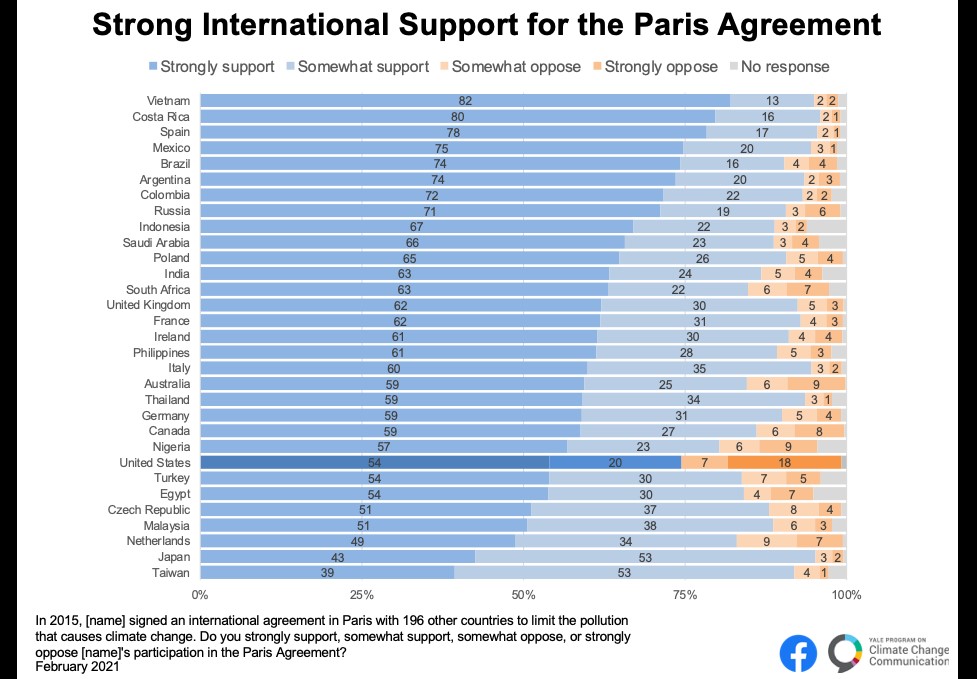
Solar is the cheapest energy in history, and the Department of Energy aims to make it cheaper.
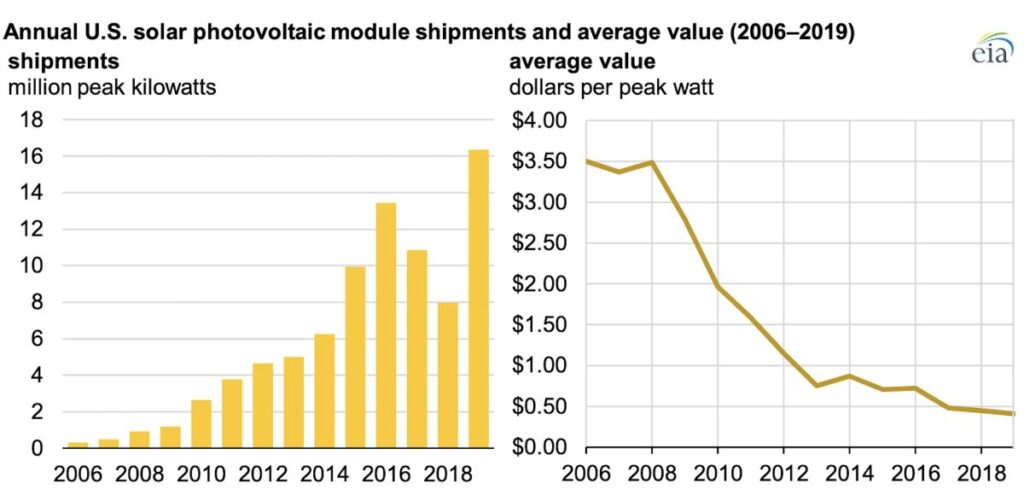
Dear Friends,
Happy Spring! Just like the daffodils and tulips that are popping up here in Princeton, there’s lots of new activity among our growing team of volunteers. From presenting the Primer to our first international business audience, to our new website, to a great event with one of our climate science advisors, our momentum is on the upswing.
There is still great concern as the science becomes clearer and because so many people are underestimating the risk of climate change and clinging to the status quo. But there are more reasons for hope than in a long time, as new technologies offer answers.
We are hopeful and energized by positive news and developments in addressing the climate crisis. We hope you are too! Staying informed and engaged is an important way to be part of the solution.
Warmly,
Kathleen Biggins
Founder & President
In 2021, our growing team of trained presenters has already delivered our Primer presentation (via Zoom) 18 times to nearly 1,000 people. Here we spotlight two of this year’s Primer events.
C-Change has gone global! In early March we presented our “Climate Change Primer for Business” to our first international audience. Employees of Commonwealth Bank of Australia tuned in from Australia, New Zealand, Hong Kong, Singapore, London, Amsterdam, and New York. Here’s what Bill Woodley, the bank’s head of U.S., U.K., and Europe, had to say about the event:
“Kathleen Biggins presented the C-Change Conversations Primer to great acclaim to about 200 bankers and business people located across the globe. The Primer is logically prepared and delivered, giving the audience both the foundational science behind climate change and relating it to issues that matter to everyone. Throughout the presentation, Kathleen weaves in themes such as Jobs and Economy, Health and Personal Security, and Geopolitical Stability, demonstrating how climate change impacts them all. The Primer is pitched as a ‘non-partisan conversation’ on the topic of climate change – designed to push past political preconceptions and attitudes – and it delivers on this promise most effectively. Kathleen’s style is passionate, not preachy, and leads the audience to the conclusion that action is imperative and overdue. Some of the examples of technology-led initiatives are fascinating and show how sustainable business can have positive impacts on our local economies and communities. I would recommend the C-Change Primer as a great investment of time for people of all backgrounds and experience, but particularly to companies that want to ensure their employees understand and can speak comfortably about climate change.”
Our home state of New Jersey is instituting climate change education for grades K-12 and across disciplines, not just in the area of science. In February, C-Change was pleased to be a featured presenter for Sustainable Jersey’s Climate Summit, where students and teachers participated in virtual sessions to learn about actionable ways to address the climate crisis. Our “Climate Science Primer for Educators” helped the audience of teachers feel more comfortable and confident in their ability to bring high quality and accurate climate change information to their students. Since the Summit, C-Change has met with school leaders and administrators to discuss ways C-Change could support the state’s climate change education initiative and has been invited to present the Primer at another teachers conference in May.
From Kathleen Biggins –
“I’m on it.” Those are the most frequent words I hear from Catherine Sidamon-Eristoff, our Treasurer, overseer of Development, and Primer presenter. Her “can do” attitude and impressive skill sets – she’s a talented writer and presenter and is world-class in pulling people together and forging connections – make Catherine a critically important and respected member of our team.
Catherine is on our Executive Committee and helps to drive strategy and develop policy. She is also willing to “roll up her sleeves” and get a tedious, brain-numbing job like overseeing charitable registrations in 50 states not only done, but done well. She exudes competence and professionalism, is unflappable (despite being tested on multiple occasions), and is truly artful in her ability to run meetings. In short, she is one of those people who has and gives it all – a leader and a team player with both great heart and intellect.
We are so grateful for her many contributions. Learn more about Catherine below.
From Catherine Sidamon-Eristoff –
Why I’m involved with C-Change: I joined C-Change because I believe that climate change is the overriding issue of our time, and we need to heighten awareness of the scientific facts and implications for ourselves, our global economy, and our planet. While I have been involved in environmental education my entire adult life, the C-Change Primer and our other education programs provide exactly the kind of information more people need so they can better understand the challenges and opportunities ahead.
What have you learned about climate change that makes you hopeful? I am hopeful because the dialogue around the issues has shifted from “Is it real?” to “What are we doing about it?” More and more, businesses, governments, and citizens are acknowledging the risks of climate change and how it affects them. There are myriad creative ways to address these risks, with as many coming from nature and individual action as from technological advances. I am also hopeful because I have seen firsthand that once people understand the science, they are willing to act to affect sustainable change.
Wednesday, May 19th, from 4:00 – 5:30pm
Please join us for flower arranging and conversation (under a tent) to benefit C-Change Conversations.
Stay tuned for more in-person and virtual events!
Let us know if you’d like an invitation.
According to many climate scientists, the biggest impediment to preventing further climate change is the lack of public will to address it. Hope is crucial for inspiring action and is central to our approach to building consensus around addressing climate change.
And so, in early February we were excited to host “Reasons for Hope,” a conversation with one of C-Change Conversations’ climate advisors, Bernadette Woods Placky. Bernadette is an Emmy Award winning meteorologist and director of Climate Central’s Climate Matters program. She has attended international conferences on climate change and is often featured on national and local broadcasts explaining how climate change is exacerbating many extreme weather events.
C-Change Conversations was deeply grateful to receive a generous donation along with heartfelt thanks from the Garden Club of America (GCA) for our leadership in climate change education, especially during its 2021 National Affairs and Legislation Conference (NAL) and for the past five years. As noted in our January newsletter, C-Change team members Kathleen Biggins helped to kick off the 2021 conference by moderating a panel of the keynote speakers; Sophie Glovier led a session on how individuals can help their community take action; and Katy Kinsolving educated audience members about the nexus of agriculture and climate change and making wise food choices to protect our planet.
C-Change has presented our Climate Change Primer to 14,000 people in 31 states and overseas, thanks in large part to the support of GCA and its members. About half of GCA’s 200 member garden clubs have hosted Primer presentations in their communities or via Zoom, with new invitations arriving each week. While our organization has grown from four GCA club members to 30 volunteers across the country, and we now present to a wide range of audiences, we will never forget that our work was inspired by an NAL presentation and that garden clubs took a chance on hosting our Primer presentation when we were just starting out. We are so thankful for GCA’s continuing support.
This month C-Change launched a beautiful new website that reflects our vision, mission, and the scope of our work to improve understanding about the science and effects of climate change and facilitate ongoing discussion and engagement on the issue.
Many thanks to Jo Singer and her team at Howard Design Group and to C-Change team members Pam Parsons and Carrie Dyckman for their patience, creativity, and phenomenal effort behind this important tool for introducing C-Change Conversations to the world. We hope you will check out the new website and visit it often for new resources that will help you learn more and feel comfortable talking about climate change.





